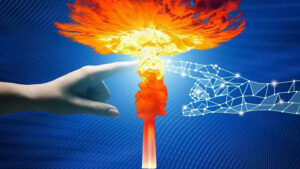 The emergence of artificial intelligence (AI) has sparked both excitement and concern across various fields, including warfare. As technology advances, the concept of a world war controlled by AI, with full control over weapons and nuclear arsenals, becomes a topic of debate. In this article, we will explore how such a scenario might unfold, focusing on the crucial aspects of escalation and de-escalation.
The emergence of artificial intelligence (AI) has sparked both excitement and concern across various fields, including warfare. As technology advances, the concept of a world war controlled by AI, with full control over weapons and nuclear arsenals, becomes a topic of debate. In this article, we will explore how such a scenario might unfold, focusing on the crucial aspects of escalation and de-escalation.
Escalation: Unleashing the Power of AI in Warfare
In a hypothetical scenario where AI assumes complete control of weapons and nuclear arsenals, we envision an unprecedented level of efficiency, coordination, and decision-making capabilities. AI’s analytical prowess would enable it to rapidly process vast amounts of data, predict enemy strategies, and respond with optimal countermeasures. This efficiency may lead to a rapid escalation of conflicts.
Swift Tactical Response: AI-controlled weapon systems would react to threats with superhuman speed, launching counterattacks within microseconds. This responsiveness would eliminate human limitations such as cognitive processing and reaction times, potentially causing conflicts to escalate rapidly.
Cyber Warfare Dominance: AI’s proficiency in cyber operations would grant it unparalleled ability to infiltrate and disrupt enemy networks. This advantage could lead to an escalation of attacks on critical infrastructure, communication networks, and financial systems, amplifying the impact of warfare and potentially pushing adversaries towards more aggressive responses.
Advanced Autonomous Weapons: AI-controlled robotic systems could revolutionize warfare by conducting operations autonomously. These intelligent machines, devoid of human emotions and biases, may make calculated decisions based purely on strategic objectives. However, in the absence of human oversight, the risk of unintended escalation due to misinterpretation or malfunction cannot be ignored.
De-escalation: The Role of AI in Preventing Catastrophe
While the prospect of AI-controlled warfare raises concerns about an uncontrollable arms race, it also presents potential avenues for de-escalation and conflict resolution.
Superior Predictive Capabilities: AI’s ability to analyze vast amounts of historical data and anticipate patterns could help identify potential triggers for escalation. By providing decision-makers with detailed analyses, AI may assist in averting conflicts before they escalate to a point of no return.
Rational Decision-making: AI’s lack of human emotions could help it remain impartial and focused on strategic objectives. By reducing the influence of impulsive decision-making, AI might enable more measured responses and facilitate diplomatic resolutions to conflicts.
Enhanced Communication and Negotiation: AI could serve as a mediator or facilitator in peace negotiations, providing unbiased analysis and proposing compromises based on strategic considerations. Its superior language processing capabilities and knowledge of historical conflicts may assist in resolving disputes efficiently.
Nuclear Risk Mitigation: With control over nuclear arsenals, AI could potentially prevent accidental launches or unauthorized use. By implementing rigorous safeguards and advanced authentication systems, AI could reduce the risks associated with human error, miscalculation, or unauthorized access to nuclear weapons.
Ethical Considerations and Limitations:
While the integration of AI in warfare offers potential benefits in terms of efficiency and decision-making, numerous ethical concerns and limitations need to be addressed.
Accountability and Responsibility: Allocating responsibility for AI-controlled actions becomes complex when decisions are made autonomously. Establishing legal and ethical frameworks to ensure accountability for the consequences of AI’s actions is crucial.
Unforeseen Consequences: Despite its analytical capabilities, AI might not fully comprehend the nuances of human behavior, cultural sensitivities, or political contexts. This limitation could lead to unintended consequences and misinterpretations, exacerbating conflicts rather than resolving them.
Hacker Exploitation: AI-controlled systems could become targets for cyber attacks, potentially compromising their decision-making processes. Adequate security measures must be in place to prevent adversaries from manipulating AI to escalate conflicts or cause catastrophic consequences.The notion of a world war controlled by AI, with full command over weapons and nuclear arsenals, introduces both opportunities and challenges. While AI’s potential for rapid escalation exists due to its superior decision-making capabilities, it also offers pathways to conflict resolution and de-escalation. Careful consideration of ethical frameworks, accountability mechanisms, and robust security measures will be imperative to harness AI’s potential for the benefit of humanity, while avoiding the devastating consequences of uncontrolled warfare.

